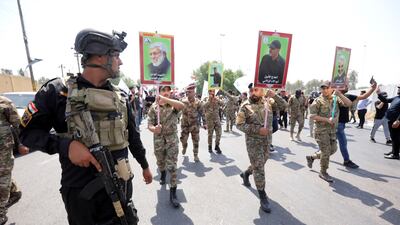An increase in attacks against American troops and interests in Iraq and Syria is leaving the Biden administration with limited options as it seeks to set a credible deterrence without being caught in a spiral of violence with pro-Iran militias.
Just this week, six attacks were launched against US troops and diplomats in Iraq and Syria, including two aimed at Ain Al Assad airbase. Two US personnel were injured in the latest of these attacks.
The other assaults, using drones and rockets, hit Erbil airport, the coalition headquarters in Baghdad, a US base in eastern Syria and the Iraqi capital's Green Zone.
The escalation followed last month's US strike on the Iraqi-Syrian border against a pro-Iranian Iraqi militia, killing four of its members. That strike was meant to deter further incidents after five previous attacks on US forces inside Iraq.
Randa Slim, director of the Conflict Resolution and Track II Dialogues Programme at the Middle East Institute, sees the current escalation by Iraqi militias as directly related to the stalled nuclear talks with Iran.
“This is related to current snags in the nuclear talks in Vienna. The attacks on US forces in Iraq and increasingly in Syria have always been part of Tehran’s negotiation leverage on the nuclear file,” Ms Slim told The National.
The US has engaged in six indirect rounds of talks with Iran on the nuclear issue, but no breakthrough that grants Tehran sanctions relief has been achieved. A seventh round is expected in the coming weeks.
The other overarching objective for Tehran is terminating the US military presence in Iraq and Syria, added Ms Slim.
But against the surge in attacks, Washington has few good options, she added, "given the weak government partner it has in Baghdad".
Ms Slim saw three options for the Biden team: continuing to respond to the attacks, with the risk of being trapped in an “escalation spiral” with the militias and Tehran; improving communication with the Iraqi people so they know to pin the blame for the violence on the Iraqi militias and Iran; and linking sanctions relief for Tehran to stopping attacks on US forces in Iraq and Syria.
Iran has continuously rejected this linkage.
But Ranj Alaadin, a senior fellow at the Brookings Institution, pointed to a complex situation inside Iraq and a weakened political system than has allowed these militias to lash out.
“The uptick in attacks comes amid a perilous political environment in Iraq and the vulnerabilities Iran's proxies face amid their internal factionalism and the very real possibility that they will suffer a major political decline after the forthcoming parliamentary elections,” Mr Alaadin told The National.
The elections are scheduled for October and a unified anti-militia front could threaten those groups, he said.
“For Iran's proxies, escalating attacks against the US reinforces a posture of strength and resiliency, and is premised on the idea that the best defence is a good offence,” Mr Alaadin added.
Without an effective US response and the inability of the Iraqi government to confront them, these militias have acquired a “dangerous luxury to adopt scorched-earth policies to secure their own survival and the interests of the Iranian regime".
Mr Alaadin recommended a stronger response from the US side.
“The Biden administration has not yet given Iran’s proxies a reason to look [over] their shoulders; attacking them and inflicting significant casualties could potentially raise the risk calculus for Iran and its proxies, and indicate that the US does have the resolve to contain these groups and establish its own red lines,” he said.
Iraqi Prime Minister Mustafa Al Kadhimi is expected to visit the White House at the end of the month.


